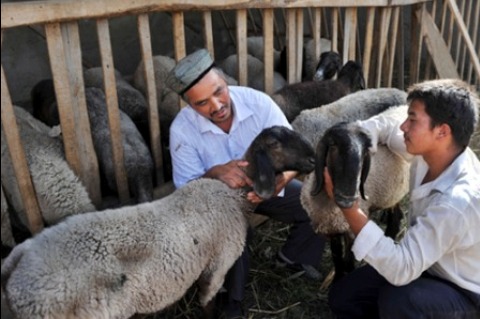Duolang sheep from Xinjiang Uyghur Autonomous Region – dubbed the “Treasure of Xinjiang” with only around 1,000 left in the world – are becoming vogue as the pets and status symbols of the super-rich in China.
Also known as Maigaiti by the locals, it is a crossbreed between a local sheep species and a fat-rumped one introduced from Afghanistan.
The sheep’s popularity is due to its peculiar cartoonish physical features: it has a large, curved nose, big eyes, long floppy ears, and a plump rear. It takes only five months for the sheep to reach maturity, with its wool changing color from black to white during this period.
A mature ram weighs around 150 kilograms and a ewe about 90 kilograms. Nearly 95% of the animal can be used for food or other purposes. The meat is juicy and does not have the usual smell of mutton.
Duolang sheep are easy to raise because they eat a wide variety of food, are highly resistant to disease and can adapt to different environments.
The most prized Duolang sheep is said to be in the possession of a farmer in Yopurga County who initially sold the sheep for RMB950 a few vdays after it was born in 2005 and then bought it back for RMB1 million when it proved to be a winning breeder.
His animal rose to prominence due to videos of it on websites.
“I can’t believe the offer has reached 14 million yuan now,” the man said, adding that the previous offer over Chinese New Year this year was 6 million yuan (US$939,000).
He said he has continued to decline the ever-increasing offers because the sheep has brought him his fortune and allowed him to buy four houses and four cars.
A sheep owner can charge 50,000-100,000 yuan (US$7,820-$15,645) a time in stud fees, while a sheep can be sold for 200,000 yuan (US$31,300). Even a lamb can fetch at least 100,000 yuan (US$15,650).
Liu Fenghua, owner of a Duolang sheep farm in Awat county, says he feeds his flock chopped wheatgrass, corn and cooked soybeans, along with dates, walnuts and almond fruits in the morning. The ewes in his flock of 19 were also given a nutritional supplement, he added.
Liu said the price of the sheep depends on its pedigree- the darker the fleece, the bigger the ears, the more curved the face, the better.
“The best ones have a dark body and white tail,” said Liu.
Liu said he bought a pair of Duolang for 25,000 yuan in 2009, and was offered 10 times the original price for them a year later.
“The price keeps rising,” he said, adding even Duolang semen can fetch up to 300,000 yuan per dose.
China’s sudden wealth has produced bubbles in all sorts of commodities, from tea to fine wine to jade.
Last year, a Tibetan Mastiff puppy became the world’s most expensive dog when it was sold for nearly £1mil in Qinghai.
 CY@CY Says Welcome to my dreamscape. Where a Lim is also a Ling.
CY@CY Says Welcome to my dreamscape. Where a Lim is also a Ling.


